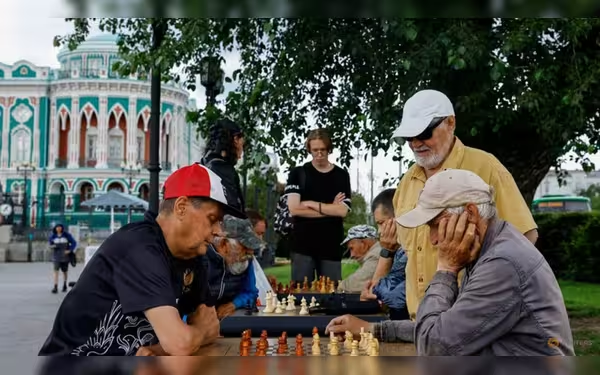Saturday, November 16, 2024 05:45 PM
FIDE Eases Ban on Some Russian and Belarusian Chess Players
- FIDE considers allowing disabled and junior players from banned nations.
- 41 delegates opposed lifting the ban; 21 supported it.
- Indian team wins gold at the 45th Chess Olympiad.
 Image Credits: channelnewsasia
Image Credits: channelnewsasiaFIDE softens its ban on some Russian and Belarusian players, allowing disabled and junior participants amid ongoing geopolitical tensions.
The chess world has been abuzz with discussions surrounding the participation of Russian and Belarusian players in international competitions since the onset of the conflict in Ukraine in February 2022. The governing body of chess, FIDE, has faced immense pressure from various stakeholders, including the Ukrainian government and prominent chess figures, to maintain a strict ban on players from these countries. This situation has raised questions about inclusivity, fairness, and the role of sports in international politics.
During the recent FIDE General Assembly held in Budapest, a significant decision was made. While the assembly upheld the ban on Russian and Belarusian players, it also took a step towards easing restrictions for certain groups. The assembly agreed to consider allowing disabled players and junior players under the age of 12 from these nations to participate in international events. This decision reflects a delicate balance between maintaining a stance against the actions of these countries and promoting inclusivity within the sport.
FIDE's deputy president, Viswanathan Anand, a former world champion, emphasized the importance of this approach, stating, "We believe this approach upholds FIDE's commitment to inclusivity while respecting the international framework." This statement highlights the organization's attempt to navigate a complex situation while adhering to its values.
The voting results from the assembly were telling. Out of the delegates from 66 countries, 41 voted against the readmission of players, while 21 supported lifting the ban entirely, and 27 either abstained or were absent. This division illustrates the ongoing debate within the chess community regarding how to handle the participation of players from Russia and Belarus.
Arkady Dvorkovich, the FIDE president and a former Russian deputy prime minister, has been at the center of this controversy. Critics, including Pieter Heine Nielsen, a former coach of Magnus Carlsen, have voiced concerns that Dvorkovich is merely buying time to avoid backlash from both Russia and the West. Nielsen pointed out the troubling reality of over a thousand chess events occurring in occupied Ukraine, questioning the lack of action from FIDE to address this issue.
As the chess community continues to grapple with these challenges, the recent assembly's decision serves as a reminder of the complexities involved in sports governance amid geopolitical tensions. The FIDE General Assembly coincided with the 45th Chess Olympiad, where teams from around the world competed fiercely, showcasing the spirit of the game. Notably, the Indian team, led by world championship challenger Gukesh Dommaraju, clinched gold in both the open and women's sections, highlighting the talent and dedication present in the chess world.
The chess community stands at a crossroads, balancing the ideals of inclusivity and fairness against the backdrop of international conflict. As discussions continue, it is crucial for organizations like FIDE to act decisively and ethically, ensuring that the spirit of chess remains intact while navigating the complexities of global politics. The decisions made today will undoubtedly shape the future of chess and its role in fostering unity and understanding among nations.













